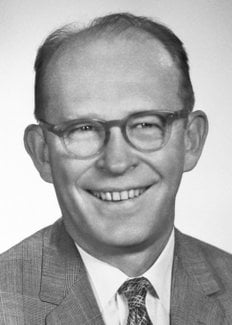Willard F. Libby
Biographical

Willard Frank Libby was born in Grand Valley, Colorado, on 17th December, 1908, to Ora Edward Libby and his wife Eva May (née Rivers).
He attended grammar and high schools near Sebastopol, California, between 1913 and 1926, moving to the University of California at Berkeley in 1927, where he studied till 1933, taking his B.Sc. and Ph.D. degrees in 1931 and 1933 respectively. He was appointed Instructor in the Department of Chemistry at California University (Berkeley) in 1933 and during the next ten years was promoted successively to Assistant and then Associate Professor of Chemistry. He was awarded a Guggenheim Memorial Foundation Fellowship in 1941 and elected to work at Princeton University, but on 8th December, 1941, this Fellowship was interrupted for war work on America’s entry into World War II, and Libby went to Columbia University on the Manhattan District Project, on leave from the Department of Chemistry, California University, till 1945.
At the end of the war, in 1945, Libby accepted the post of Professor of Chemistry in the Department of Chemistry and Institute for Nuclear Studies (now the Enrico Fermi Institute for Nuclear Studies) of University of Chicago, remaining there till his appointment by President Eisenhower on 1st October, 1954, as a member of the U.S. Atomic Energy Commission.
This appointment was renewed by the President for a further five-year term on 19th June, 1956, but Libby resigned from it on 30th June, 1959, to become Professor of Chemistry in the University of California at Los Angeles, being appointed Director of the Institute of Geophysics and Planetary Physics on 1st January, 1962.
Libby has performed a wide range of scientific advisory and technical consultant work with industrial firms associated with the Institute for Nuclear Studies, as well as with defence departments, scientific organizations and universities. From 1945 to 1952 he was a Member of the Committee of Senior Reviewers of the Atomic Energy Commission; from 1950 to 1954 he was a Member of the Commission’s General Advisory Committee and was re-appointed to this Committee by President Eisenhower in June, 1960. He has been a Member of the Plowshare Advisory Committee since 1959; a Guggenheim Memorial Foundation Fellow in 1941, 1951 and 1959-1962; a Member of the Advisory Board of the Guggenheim Memorial Founclation, being re-elected in May, 1960, for a further term of four years; a Research Associate of the Carnegie Institute of Washington Geophysical Laboratory from 1954 to 1959. He has served as Consultant to the Office of Civil and Defence Mobilization (1959-1961) and also as a Member of the Advisory Council to the Coordinator of Atomic Activities of the State of California since 1959. He is, since 1963, Director of the Douglas Aircraft Company, and Member of the National Science Foundation’s General Commission on Science, the Federal Government and the Academic Institution.
Libby is a Physical Chemist, and specialist in radiochemistry, particularly hot atom chemistry, tracer techniques, and isotope tracer work. He became well-known at University of Chicago for his work on natural carbon-14 (radiocarbon) and its use in dating archaeological artifacts, and natural tritium, and its use in hydrology and geophysics.
Besides the Nobel Prize in Chemistry for 1960, he received other distinctions, including the Research Corporation Award for 1951 for the radiocarbon dating technique; the Chandler Medal of Columbia University for outstanding achievement in the field of chemistry (1954); the American Chemical Society Award for Nuclear Applications in Chemistry (1956); the Elliott Cresson Medal of the Franklin Institute (1957); the American Chemical Society’s Willard Gibbs Medal Award (1958); the Albert Einstein Medal Award (1959); the Day Medal of the Geological Society of America (1961).
Libby’s book, Radiocarbon Dating, was published by the University of Chicago Press in 1952, and a second edition appeared in 1955. He is also the author of numerous articles, which appeared principally in scientific journals. Since 1960 he is member of the Editorial Board of the Proceedings of the National Academy of Sciences, and since 1962 member of the Editorial Board of Science.
Professor Libby holds memberships of numerous learned societies in the United States; he is also Member of the Heidelberg Academy of Sciences, of the Bolivian Society of Anthropology, and is Foreign Member of the Royal Swedish Academy of Sciences (1960).
He is married to the former Leonor Hickey of King City, California. They have twin daughters Janet and Susan (b. 1945).
This autobiography/biography was written at the time of the award and first published in the book series Les Prix Nobel. It was later edited and republished in Nobel Lectures. To cite this document, always state the source as shown above.
Willard F. Libby died on September 8, 1980.
Nobel Prizes and laureates
Six prizes were awarded for achievements that have conferred the greatest benefit to humankind. The 14 laureates' work and discoveries range from quantum tunnelling to promoting democratic rights.
See them all presented here.
